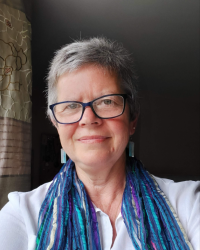The hidden bruise: Reflections on grief and grieving
Imagine you’re walking in a park one day. Some children are playing a ball game, and the ball accidentally hits your arm. “Ow!” you think, “that hurts!” But you walk on, rubbing your arm, and say nothing.

Next day, same park, different children playing ball. The ball hits you in exactly the same spot, where you’re already bruised from the day before. “Ow!! That really hurts!” It hurts so much, you can’t help but cry out. “What’s the fuss?” say the people around you. “It was only a little tap with a plastic ball!”
They don’t know that you were already carrying a hidden bruise.
Grief can be like this, too. We may endure a bereavement with little or no apparent trouble, absorbing the loss into our life without breaking step, taking it all in our stride. Perhaps the busy-ness of everyday life carries us along; perhaps we’ve been taught not to let our feelings get the better of us, so we don’t show the hurt. Perhaps we simply can’t allow ourselves the time to grieve.
This might happen, for example, if a mother loses a parent while she’s caring for a new baby; the needs of the new baby may mean that she simply can’t grieve just now. Or, if a young person is about to sit important exams when a parent or a beloved grandparent dies; or any other situation where a bereavement occurs at the same time as another major life event, like starting a new job or moving house.
Sometimes, the grieving process is just deferred. All the natural feelings of grief, including sorrow, anger, confusion, and eventually, acceptance, come to the surface once there is room for them in the person’s life.
It might be once the baby is more settled, when the exams are over, the job feels secure or the move is complete. This can take people by surprise. “Why am I feeling so sad, all of a sudden? Mum died months ago!” It can be helpful to understand that this may be a normal delayed grief response.
Sometimes, however, that deferred grieving process isn’t triggered until the person experiences another loss, just like the 'hidden bruise' in the scenario above. You may be carrying an unresolved loss, possibly from many years ago, when another loss hits you.
Even though the second loss may not seem significant to others, the combined force of the unresolved loss and the more recent loss may overwhelm you. We may think a friend is 'over-reacting' to the death of a celebrity, or a distant relative; maybe they were carrying a hidden bruise, and this more recent bereavement has hit a tender spot.

In the bereavement charity where I volunteer, and in my independent practice, this is a common experience. A client may be puzzled themselves by their grief response. They may say, “I don’t know why I’m so upset about this!” or even, “There must be something wrong with me…” My role is to create a safe space where they can open up to all of their feelings, those near the surface and those hidden deeper, and begin to heal the losses, past and present.
Often, what we discover once we start to look beyond the most recent loss is a hidden bruise from a previous, unresolved bereavement – sometimes, so long ago that the client hasn’t even recognised the event as a loss. This might be losing contact with a parent through divorce, losing friendships through moving house, or the loss of a much-loved family pet who offered warmth and companionship in the client’s childhood.
Sometimes, the hidden bruise may be an abusive relationship or the absence of love and affection in early life. These may be making the pain of the current loss more intense; they may also be getting in the way of the person accessing support from their friends and families.
If you have a childhood experience of being told to “get over it” (for example, in response to the loss of a family pet), or to “keep a stiff upper lip,” as is still common for many people, you may not feel you have permission to talk about your sadness, anger, or anxiety. You may not even realise that you have these feelings but they will almost certainly be there because they are normal human responses to life events.
Once we have uncovered these earlier losses and allowed those feelings to come to the surface, clients often find that they are more able to manage their current grief. That’s not to say that it goes away, or they no longer feel sad; just that they feel less overwhelmed and more able to learn to live with the loss, without the old pain and distress getting in the way.
Although grief is universal and inevitable, we all experience it in our own unique and individual way. So, be kind to those around you and accept that they will grieve in their own time, in their own way, at their own pace. If they seem to grieve too much, remember that they may be carrying unresolved or deferred grief.
And be kind to yourself, too, if you're the one with the hidden bruise.

Find a therapist dealing with Bereavement
All therapists are verified professionals






